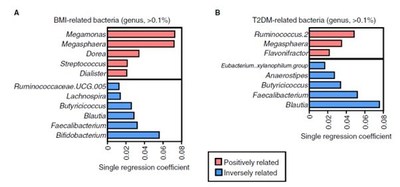KYOTO, Japan, Aug. 30, 2022 /PRNewswire/ -- A collaboration between researchers at the National Institutes of Biomedical Innovation, Health and Nutrition, Noster Inc., and institutions throughout Japan has found that the bacterium Blautia wexlerae inhibits obesity and type 2 diabetes. The results are reported in Nature Communications. The finding may lead to the development of novel therapeutic strategies for these and related metabolic disorders.

Obesity is a major public-health issue, partly because its role in type 2 diabetes, caused by overnutrition, genetic background and environmental factors. One such factor is the set of microorganisms in a person's stomach known as the gut microbiota. These can produce substances that promote obesity or type 2 diabetes, but can also produce molecules that have anti-obesity or anti-diabetes properties. It is known that the gut microbiota is different for people from different geographical regions, because of differences in diets and genetic histories. It is also known that people with type 2 diabetes and obese persons have an altered gut microbiota composition. The Japanese diet in particular is unique, and the gut microbiome of Japanese people shows high abundance of Blautia bacteria. At the same time, Japanese people have the highest average life span worldwide, as well as a very low body mass index (BMI). Jun Kunisawa from the National Institutes of Biomedical Innovation, Health and Nutrition, and collaborators at Noster Inc., and research institutes throughout Japan have now investigated the link between the presence of Blautia bacteria and obesity and type 2 diabetes, and have revealed an inverse correlation.
A statistical analysis of the gut bacteria of 217 Japanese adults showed that Blautia bacteria are less abundant for obese (defined as having a BMI of 25 kg/m² or higher) people and for people with type 2 diabetes. The researchers checked that other factors such as age, sex and medication do not influence the proportion of Blautia in the gut.
Kunisawa and colleagues then analyzed which species of the Blautia genus are inversely correlated with obesity and type 2 diabetes. They found that the abundance of the Blautia wexlerae species was almost equal to that of Blautia overall.
The finding regarding Blautia wexlerae suggested that the gut bacterium might ameliorate obesity and type 2 diabetes. The scientists therefore studied the effect of administering the bacterium to mice that had been on a high-fat diet inducing obesity and diabetes. The bodyweight gain of the mice was suppressed, and Kunisawa and colleagues found that it also had inhibitory effects on diabetes. An analysis of the chemical processes taking place showed that Blautia wexlerae contains various small biomolecules (called metabolites) that have anti-inflammatory properties and promote energy metabolism.
Kunisawa and colleagues point out that whether Blautia wexlerae reduces obesity and diabetes in humans remains unclear - follow-up studies are needed. Nevertheless, quoting the scientists, "the discovery of a metabolic role of the gut microbiota in the pathophysiology of obesity and type 2 diabetes mellitus reveals opportunities for the development of preventive methods … and therapeutic approaches for metabolic disorders."
Background
Obesity and type 2 diabetes
Obesity refers to the condition of abnormal or excess body fat having extensively accumulated in such a way that it can have a negative effect on health. Obesity is usually defined via the body mass index (BMI, a person's weight divided by the person's height squared). Some definitions of obesity use a BMI of 30 kg/m² as the threshold, others use a BMI of 25 kg/m² as the starting point.
Obesity is correlated with several other conditions and diseases, including type 2 diabetes. The latter is a form of diabetes characterized by a high blood sugar, insulin resistance, and a relative lack of insulin. The long-term complications of type 2 diabetes include heart disease, strokes, and kidney failure. Type 2 diabetes mainly occurs as a result of obesity and insufficient physical exercise.
The combination of obesity and type 2 diabetes is sometimes called 'diabesity'. Factors that can lead to diabesity include genetic history, diet, lack of exercise and gut health.
The role of gut bacteria has now been studied by Jun Kunisawa from the National Institutes of Biomedical Innovation, Health and Nutrition, Noster, and colleagues at other research institutes in Japan. Starting from the notion that Japanese people have a high life expectancy, a low BMI, and a particular diet, they looked for inverse correlations between particular gut bacteria and obesity and type 2 diabetes. They identified Blautia wexlerae as a gut bacterium that likely ameliorates obesity and type 2 diabetes.
Reference
Koji Hosomi, Mayu Saito, Jonguk Park, Haruka Murakami, Naoko Shibata, Masahiro Ando, Takahiro Nagatake, Kana Konishi, Harumi Ohno, Kumpei Tanisawa, Attayeb Mohsen, Yi-An Chen, Hitoshi Kawashima, Yayoi Natsume-Kitatani, Yoshimasa Oka, Hidenori Shimizu, Mari Furuta, Yoko Tojima, Kento Sawane, Azusa Saika, Saki Kondo, Yasunori Yonejima, Haruko Takeyama, Akira Matsutani, KenjiMizuguchi, Motohiko Miyachi, and Jun Kunisawa. Oral administration of Blautia wexlerae ameliorates obesity and type 2 diabetes via metabolic remodeling of the gut microbiota, Nature Communications13, 4477 (2022).
DOI: 10.1038/s41467-022-32015-7
URL: https://www.nature.com/articles/s41467-022-32015-7
Contact details
Noster Inc., International Relations,
35-3 Minamibiraki, Kamiueno-cho,
Muko-shi, Kyoto, 617-0006, Japan
E-Mail: contact@noster.inc
Telephone: 81 (0)-75-921-5303
Noster
Noster Inc. website
https://www.noster.inc/
Noster's analytical services
https://www.noster.inc/services/
Photo: https://mma.prnewswire.com/media/1887908/Noster_Inc_BMI_related.jpg

